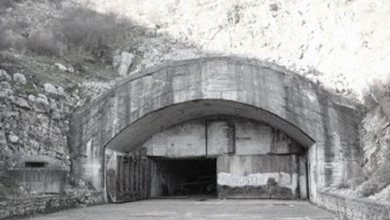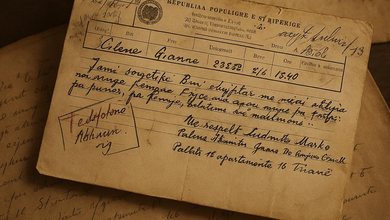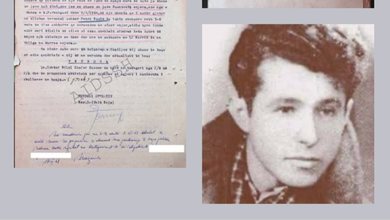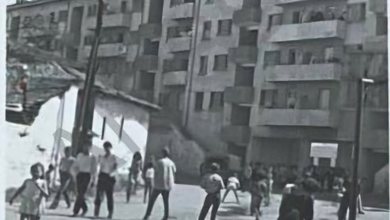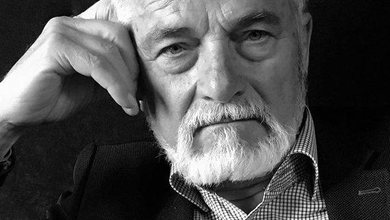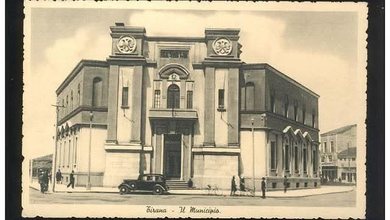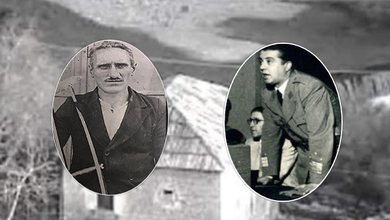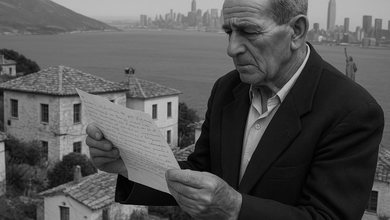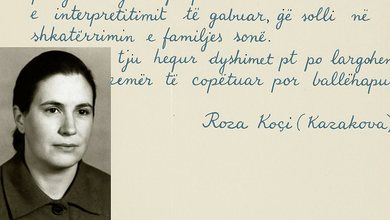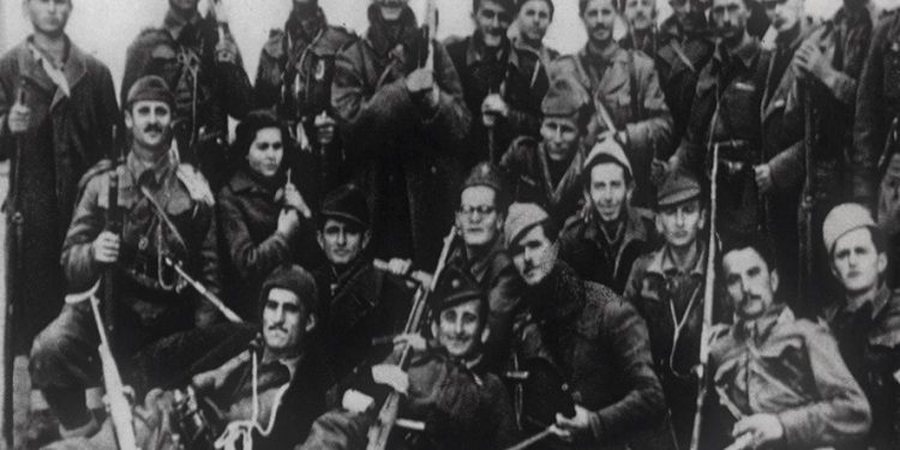
After two publications, “Massacre in Buzëmadhe” (1996 and 2015), is the latest and most complete book by the researcher and writer Petrit Palushi. The author sheds light on the enigmatic event of 1944, the year in which 21 innocent civilians of Buzëmadhe were shot. Petrit Palushi's book “Massacre in Buzëmadhe” is a tribute to the 21 victims of the massacre of September 26, 1944, it is a commemoration and a bow to the sacrifice of 16 women who would remain widows and the parents of 58 orphaned children. Fragmentation and context have always bothered me and provoked me at the same time, as two notions that I cannot ignore! Only rereading makes the achievement of a work more complete. I start rereading it…!
The book “Massacre in Buzëmadhe” (by Petrit Palushi) deals with one of the most painful events on the eve of the end of World War II, the shooting of 21 people in September 1944 at “Kroi i Bardhë” in Buzëmadhe. This work is a tribute to those victims and an enlightenment for the descendants of the 21 killed, at the same time a memory and reflection of the horrors that Shefqet Peçi, with his Brigade in Lumë, brought.
The author of the monograph book, Petrit Palushi, with a discourse of the cinematic flow, brings to today's readers a painful event that must be remembered in all its dimensions of that hot September afternoon, in the tragic inter-Albanian "conflict" in the village of Buzëmadhe. With this book, the author Petrit Palushi has fulfilled the mission of a writer, a historian who must be bowed to with admiration and an example of preserving memory. The book "Massacre in Buzëmadhe" is a work structured in 12 titled chapters, in three substantive parts.
The first part, which the author Petrit Palushi describes in the course of time, one of the worst massacres that have occurred in the Luma region, that of September 26, 1944, in which 21 people were killed, is named by the title of the book itself “Massacre in Buzëmadhe”. The book begins with a preface or introduction in which the author compares the Buzëmadhe massacre with the tragedy “Macbeth”. While nearly three and a half centuries ago, King Duncan is killed as a guest by Macbeth, in the latter’s house, the Fifth Partisan Brigade, led by Shefqet Peçi, treacherously kills the hosts, 21 residents of the village of Buzëmadhe!
A comparative fragment, a discourse of epic proportions for remembrance that happens only once and to be the permanent pain: “… 340 years later, after Macbeth’s crime against King Duncan, in Luzëmadhe e Luma a similar crime would be committed against its inhabitants, but twenty-one times more. The crime, premeditated twenty-four hours earlier, would be committed in the place with the strange name: “Kroi i Bardhë”, right at the peak of the day of September 26, 1944. The scene in “Krue të Bardhë”, at first glance is identical to the scene of Shakespeare’s tragedy “Macbeth”.
In the tragedy "Macbeth", King Duncan, as a guest of Macbeth, is killed by the latter, thus the invitation of the host to the host is misused, while in the tragedy of Kroi i Bardhë, the guests in Buzëmadhe, that is, the uninvited guests of the night of September 25, 1944, partisans of the Fifth Partisan Brigade, the next day, after eating breakfast, break the most traditional rule of hosts: they call the men of the village of Buzëmadhe for a meeting that, according to them, would be held at "Krue i Bardhë" and there they carry out the order of the commander of the Fifth Partisan Brigade, in his presence, to execute 21 of the hosts of the previous night.
In short, despite all the similarities, it is a different crime in the two tragedies. In Shakespeare's fantasy tragedy, it is the guest or host (King Duncan) who is killed by the host, the owner of the house, while in the tragedy of "The White Crow" it is precisely the guests who execute the owners of the houses where they spent the night. But the 21 inhabitants of Buzëmadhe were neither kings nor sons of kings..."!
While the "first part" includes the main "chapter" of the book in the other two "parts" titled "From the stories/1" and "From the stories/2", the stories come, the five authentic stories of witnesses to the event or members who had survived (Hysen Sali Lala, Halim Sali Lala, Tahir Arif Lala, Shani Ramiz Lala, Shahe Riza Hoda-Cena) in one "part" and in the other "part", the last one also includes the stories of members found alongside the partisans (Nënoçe Osmani, Mezin Aliaj, Derro Deraj and Elmaz Hasanmataj) according to the quote, mainly taken from Vangjel Kasapi's book, "Miracle of Nature, Castle of History", published in 1998.
A sudden solo trip from Pristina to Kukës, now belongs to a close moment. Monday afternoon was ordinary. The weather began to change and the spring rain had turned into a winter cold. The city on the roots of Gjallica right at the corner of the confluence of two rivers, the White Drini and the Black Drini, coming from “opposite” directions, was breathing, with a football match between two successful clubs from Tirana and Kukës. After the match, I met the famous writer Petrit Palushi for the first time.
A donated book, in today's time, is a mission that can be badly exceeded, to the point of oblivion! Older generations may view this phenomenon with hesitation, however, we hope. "Buzëmadhe", a name that provokes you. "Massacre in Buzëmadhe", is a book that does not let you stop reading until the end, to remain imprinted that mountain village in your memory, without yet visiting it, without touching it, without seeing it.
Between an artistic narrative and the material of documented historical data, the book “Massacre in Buzëmadhe” (which lacks the necessary photographs in such publications, even of the village in modern times), reveals an entire era of pain after a previously “untold” tragedy! This book is like a “mirror of the narrator” of an “unilluminated” event.
Author Petrit Palushi feels a responsibility towards himself as an obligation, not only towards the victims, but also towards the future. He also "asks" for help from the famous Anglo-Irish writer Oscar Wilde, as an interweaving of infinite thoughts: "...No one is rich enough to buy his past" (O. Wilde), seems to me quite appropriate for the story in 'White Head', a story which, despite its hazy cover, from that dark black fog thrown hastily and chaotically over it, now comes finely illuminated, without any shortcomings..."!
Accuracy and truth shine through painfully. "People tell the story as if it were a recent event and have recorded everything with precision," the day of the massacre, the first days and nights after the massacre, the graves of the massacred in order, and those who tell the story are of different ages, but during the narrations they are extremely accurate, extremely precise, since the event, being reported often, being repeated all the time, has made a significant place in everyone's memory"!
The reasons for the doubts of a letter as an enigmatic alibi, come in a new dimension with the exhaustive variation of the purpose. "First, it has often been repeated that the letter reached Shefqet Peçi late and that, if it had gone earlier, the massacre would not have been carried out. (The same thing was said after the execution of Ramize Gjebrea, as such a letter Ramize Gjebrea, who was executed on March 7, 1944, based on a decision of the partisan court signed by Shefqet Peçi, Hysni Kapo, Manush Mufti, etc.)
Secondly, it is said that Shefqet Peçi took the letter and tore it up in a fit of rage; that is, he ignored what was written on the letter and carried out the massacre. Thirdly, the imagination of uninformed people often created the mindset that Enver Hoxha did not know about the crimes that could be committed and that, according to that mindset, he could not allow them…”! All this, because; “so that an attempt to create a continuous coma would not blur the truth and it would sink into a dark and inescapable background”.
And finally, the gloomy atmosphere of nearly half a century speaks with the language of reality and the illumination of truth. "But with the change of the communist system, the events of September 1944 began to be taken up again with coolness, starting first by browsing the documents of the time that had been changed until then in the archives of the time, but also by taking as a basis the accounts of the witnesses of the time, especially those who were burdened by the primitivism of the partisan formation of the Fifth Assault Brigade. Little by little, a new dimension was achieved, the gloomy atmosphere was re-dimensioned."
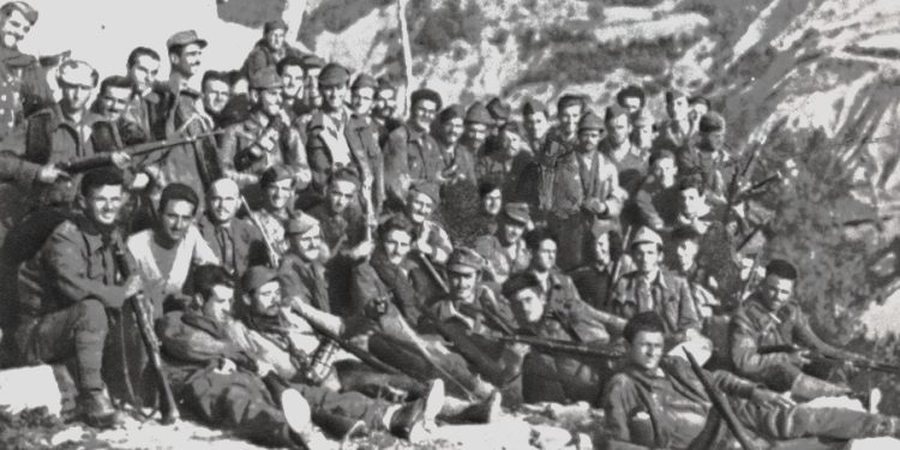
The pain never ends. It crosses the boundaries of legends. And of human life. The survivor of the Hysen Sali Lala massacre (in a conversation with the author of the book in September 1994, fifty years after the event at Kroi i Bardhë) says: "I can only blame the sadness of that day on the Night of the Dead."
Halim Sali Lala, whose story is repeated over the years, says: “It is an event that is not easily forgotten. And there is no way to forget it!” (…) “You are so sad that you cannot even remember. I became completely helpless.” (…) “I had no strength to walk or speak, I remained like a tree in place.”
The scale of the crime was horribly experienced. It was kept in the subconscious like a nightmare that needs to be released. But the crime exceeded every limit. Tahir Arif Lala: “… it never occurred to me that they would trick our boys into going to the ‘White Fountain’ and doing the unthinkable”! (…) “If we mourned the people they killed, not even the women of Reç can mourn that”! (…) “… it was a regime that is hard to remember”! (…) “… he had made a black name for himself. Even in Kosovo he had shed blood, he had killed all the innocent people”!
Witnesses recount the nightmare of those days in detail even half a century later.
Shani Ramiz Lala: “I will tell you the words to the end”. (…) “Remzi Islami was shocked…”! Life as a sacrifice and the unexpected event as destruction. Shahe Riza Hoda-Cena: “We were left four orphans. We grew up with great difficulty, because growing up without a father is like growing up without a home”! (…) “That party made us helpless, destroyed us, trampled on us and left us to swallow life with god”.
In the end, the third "part" of the book, or the second appendix of the narratives, comes as a kind of penance, but which essentially has the "compression" of a historical book, with data from the opposite side, "them".
Nënoçe Osmani: “God forbid you forget the Kuksi expectations, my friend.” (…) “Once, when I had the opportunity to meet him, I mentioned Buzëmadhe to him, but he remained silent as if in the face of a grief and did not utter a word.”
A kind of repentance, an imbalance in the dialogue between Mesin Aliaj and Hito Çako, 23 years after the massacre (1967)! An exoneration of conscience, which was no more than a monologue in itself.
Mezin Aliaj: "We did not speak further, because we were both afraid of the bitter truth. The Kuksians, as a counterweight to the commemoration of Hysen, made 21 martyrs-shehitër (martyrs)". Former member of the Fifth Brigade, Derro Deraj from Brataj, said that "reality and honor did not dissolve in water". And indeed, in the perfect "format", they come in Petrit Palushi's book "Massacre in the Big Lips".
Analogies are necessary. Especially, in the case when we are dealing with a writer who deals with a historical fact, not only documented, but also with surviving participants. While, in the literary aspect, it is said that; “historicism cannot transform a 20th century mind”, the writer Petrit Palushi, in the wake of the successful achievements of the enlightenment of the anathemaed period, also literary, manages to intertwine the reality of a painful tragedy with an artistic language, thanks to the dedication and responsibility that an intellectual of the time feels in the great breakthroughs and “breaks” that occur in a society.
There are periods when time seems to move much faster than in another period. The dimensions of a loss are preserved in the "darkest" areas of consciousness. They are not forgotten. In the code of memory, as a wisdom and warning of the people, it is said that even the slaughter (as a sign or the most hated and hidden "object") has revealed the murderer! It may be delayed, but in no case has the crime disappeared beyond recognition./ Memorie.al


